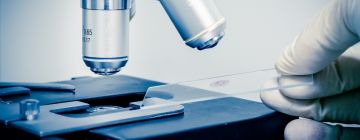
Why was this course developed?
The Certificate in Biopharmaceutical Analysis and Cell Culture will provide students with an in-depth knowledge and skills in biopharmaceutical production, analysis and cell culture-related topics. Students will be exposed to a set of technologies that provide state-of–the-art tools for genomics, proteomics, metabolomics, drug discovery, screening and the analysis of biomolecules, such as DNA, proteins and small metabolites (biopharmaceuticals).
This course was developed to provide the student with an in-depth knowledge of and the skills used in biopharmaceutical production, analysis and cell culture-related topics. Students will be exposed to a set of technologies that provide state-of-the-art tools for genomics, proteomics, screening and the analysis of recombinant proteins and monoclonal antibodies. In addition, an overview of emerging cell and gene therapies, including genome editing, will be provided. The course will also introduce different techniques to analyse biopharmaceuticals, including immunoassays and next generation bioarrays and bioassays. The practical aspects of the course will cover up/downstream biopharmaceutical purification and analysis techniques, and essential cell culture skills.
The course will also train the student to critically evaluate approaches for method development and quality monitoring in biopharmaceutical production and to identify future trends in the biopharmaceutical industry. In summary, this course will furnish the student with a competency required to undertake mammalian cell culture projects, the ability to select the best techniques needed to analyse different biopharmaceuticals, and a qualification that is particularly relevant to the rapidly growing biopharmaceutical sector.
What are the learning outcomes?
- On successful completion of this module, a student will be able to:
- Evaluate the principles of biopharmaceutical analysis and cell culture.
- Critically evaluate the different techniques (traditional and modern) used in biopharmaceutical analysis and cell culture.
- Ascertain and optimise suitable practical techniques for biopharmaceutical analysis from troubleshooting to successful experimental outcomes.
- Competently devise the appropriate medium and growing conditions for different mammalian cells and perform routine maintenance and troubleshooting of the cells.
- Critically evaluate and revise approaches for method developments and future trends in the area of biopharmaceutical analysis and cell culture through scientific literature.
How is this course delivered?
- The Certificate in Biopharmaceutical Analysis and Cell Culture programme is taught using a block approach on a part-time basis to facilitate students in full-time employment.
- Since this course is also offered as one module of the two year MSc in Analytical Science with Quality Management programme, the Certificate in Biopharmaceutical Analysis and Cell Culture is only offered once every two years.
- Over the duration of the programme, students will be required to attend SETU for approximately 8 days from January to June.
- This programme will be delivered through a blend of lectures, laboratory practicals and independent study. Students will be required to attend SETU for five days of lectures, in addition to three days of laboratory practicals.
- Continuous assessment will be carried out throughout the course of the programme.
The Certificate in Biopharmaceutical Analysis and Cell Culture programme is aimed at those already working in the pharmaceutical and biopharmaceutical industries. This programme is also suitable for students intending to/already undertaking postgraduate research study.
Biopharmaceutical Analysis and Cell Culture Entry Requirements
- Applicants for entry to this programme should hold a Level 8 Bachelor’s degree at honours level minimum 2.2 in an appropriate subject area or equivalent qualification.
- Applicants whose first language is not English must submit evidence of competency in English, please see SETU's English Language Requirements for details.
How to Apply
Once our application portal opens, the link to apply will appear on the course page above.
Subject to satisfying the aforementioned entry criteria, applicants will be offered places on a first-come-first-served basis per their application submission.
This course places a strong emphasis on the professional development of the graduate. Such a qualification will enable and facilitate career progression for graduates in research and development in biopharmaceutical industries.
Further study opportunities
This programme can be taken as a stand-alone Certificate worth 10 credits at level 9, or if the student wishes, they can use these credits towards the 60 credit Postgraduate Diploma in Analytical Science with Quality Management SE51H /SE51J or the 90 credit MSc in Analytical Science with Quality Management SE51H /SE51J
Stream Leaders

Dr Mike Kinsella
Lecturer in Chemistry/Organic Chemistry & Researcher, PMBRC -
Email: [email protected]
Profile
Dr Richie Ryan
Pharmaceutical Science Lecturer -
Call: +35351845509
Email: [email protected]
Profile
